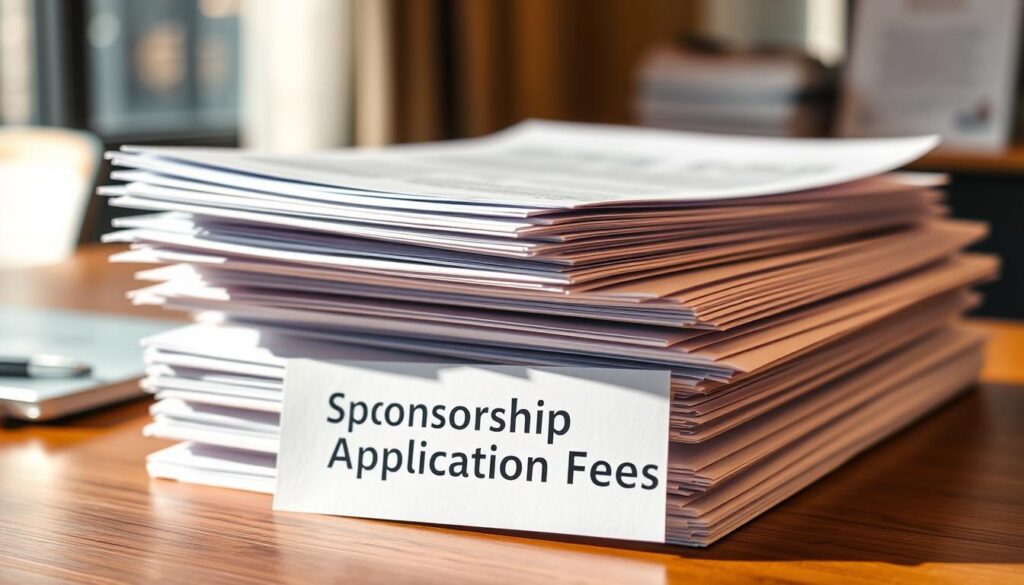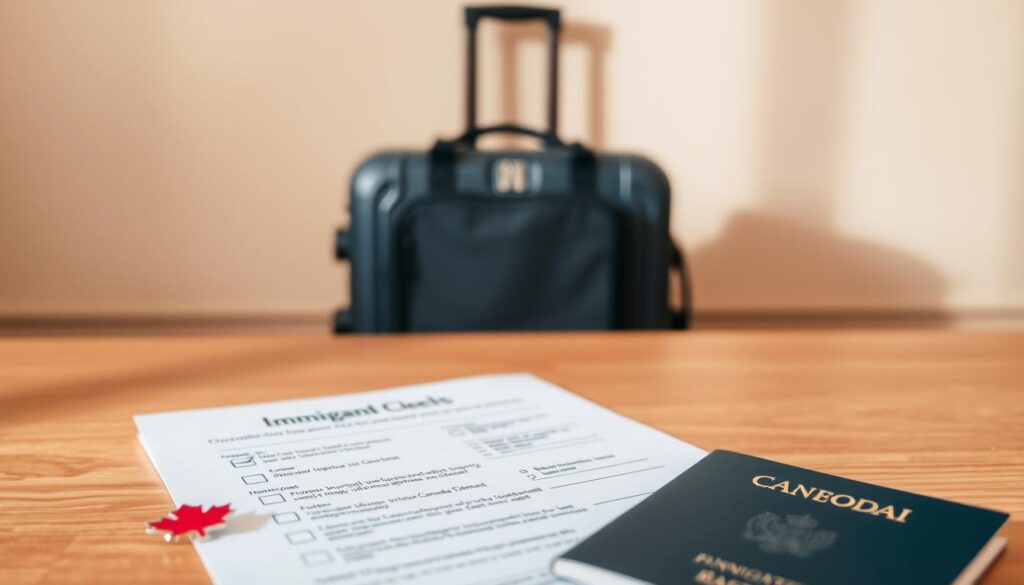Bringing family members to Canada is a common goal for many immigrants. However, sibling sponsorship has strict rules. The process involves financial commitments, eligibility checks, and navigating the Canada visa portal.
Did you know only 1.5% of annual immigration spots are allocated for siblings? This makes understanding the requirements crucial. Quebec has different regulations, adding another layer of complexity.
The lonely Canadian rule offers exceptions for those without other relatives in the country. Proper documentation and proof of relationship are mandatory. Financial stability is equally important when applying through the official immigration system.
This guide explains the step-by-step process. You’ll learn how to determine eligibility and submit applications correctly. The family sponsorship program requires careful planning to avoid delays or rejections.
Introduction to Sibling Sponsorship in Canada
Canada’s family sponsorship program has unique rules for siblings. Unlike spouse or parent sponsorships, reuniting with brothers or sisters requires meeting stricter criteria. This reflects the country’s focus on immediate family members first.
What Is Family Sponsorship?
Family reunification allows Canadian citizens or permanent residents to bring relatives to Canada. Sponsors must be 18+ and prove financial stability. They commit to supporting the sibling for up to 20 years, depending on age.
Key responsibilities include:
- Providing basic needs like housing and healthcare
- Ensuring the sibling doesn’t need government aid
- Submitting proof of relationship through birth certificates
Why Sponsor a Sibling?
Emotional bonds drive many applications. Others seek to sponsor sibling for practical support, like childcare or eldercare. However, Canada allocates only 1.5% of annual immigration spots to siblings.
Quebec has separate rules, requiring additional agreements. Always verify provincial requirements before applying.
Who Can Sponsor a Brother to Canada?
Sponsoring a sibling to Canada involves meeting strict government criteria. The process prioritizes immediate family, making sibling reunification rare. Only those fulfilling financial, legal, and residency requirements qualify.

Eligibility Requirements for Sponsors
To be an eligible sponsor, you must:
- Be 18+ and a Canadian citizen or permanent resident.
- Prove sufficient income to support your sibling for 20 years.
- Reside in Canada (exceptions apply for citizens living abroad).
Certain conditions disqualify applicants. These include unpaid child support, violent criminal records, or bankruptcy. Quebec residents must sign an additional undertaking agreement.
Exceptions: The “Lonely Canadian” Rule
This exception applies if you have no living parents, spouse, or dependent children in Canada. It also covers sponsoring an orphaned brother under 18. Documentation like death certificates or legal guardianship papers is mandatory.
Example scenarios:
- A single adult with no relatives in Canada.
- A sponsor whose parents are deceased or untraceable.
Understanding the Canada Visa Portal
Navigating the Canada visa portal is essential for a smooth sponsorship journey. The Immigration, Refugees and Citizenship Canada (IRCC) website guides applicants through every step. Proper use reduces errors and speeds up approvals.
Navigating the Immigration Website
The IRCC portal organizes tools into clear sections:
- Application packages: Download instruction guides and document checklists.
- Online forms: Fill and submit digitally with auto-validation.
- Case tracking: Monitor real-time updates after submission.
Create an account early to save progress. Bookmark the Family Sponsorship page for quick access.
Key Resources for Sponsorship Applications
Prepare these critical items before starting:
- Medical exam results from government-approved physicians
- Police certificates from all countries lived in for 6+ months
- Proof of relationship (birth certificates with parents’ names)
Biometrics enrollment is mandatory. Schedule appointments at designated centers after receiving the instruction letter.
Avoid these mistakes:
- Missing signatures or outdated forms
- Inconsistent personal details across documents
- Late fee payments (use the portal’s secure online system)
For direct links to forms, visit the IRCC Forms Repository. Double-check each document against the checklist.
Step-by-Step Guide to Sponsoring Your Brother
Securing Canadian permanent residence for siblings demands careful planning and precise documentation. The process involves three phases: confirming eligibility, gathering proofs, and submitting the application. Missing even one requirement could delay approval by months.

Step 1: Confirm Your Eligibility
Begin with a thorough assessment of your status. You must be a citizen or permanent resident aged 18+. Financial stability is non-negotiable—the government evaluates your ability to support relatives for decades.
Key checks include:
- No outstanding child support or bankruptcy filings
- Residency in Canada (unless you’re a citizen abroad)
- Meeting Quebec’s additional rules if applicable
Step 2: Gather Required Documents
Document preparation takes 6–12 months. Declare all family members, including the sibling’s spouse or dependents. Updates to marital status must be reported immediately.
Essential items:
- Birth certificates showing shared parents
- Police clearances from every country lived in
- Medical exams by approved physicians
Step 3: Submit the Application
Choose between online or paper submission. The IRCC portal auto-validates forms, reducing errors. After paying fees, track progress using your unique reference number.
“Incomplete applications account for 37% of rejections. Double-check every signature and date.”
Post-submission, monitor your account for biometrics requests or additional proofs. Respond within deadlines to avoid closures.
Financial Obligations for Sponsorship
Financial responsibility is a cornerstone of family sponsorship in Canada. The government requires proof of stable income to ensure sponsors can support relatives without relying on public aid. These rules protect both newcomers and taxpayers.
Minimum Necessary Income Requirements
Your income must meet or exceed the minimum necessary income thresholds, based on the Low Income Cut-Off (LICO). For 2023, a single applicant needs at least $25,921 annually. Larger families require higher amounts.
| Family Size | Minimum Annual Income (CAD) |
|---|---|
| 1 person | $25,921 |
| 2 people | $32,270 |
| 3 people | $39,672 |
Quebec uses separate calculations. Include bonuses, pensions, and employment income—but not EI or social assistance.
Duration of Financial Support
Sponsorship commitments last 3–20 years, depending on the sibling’s age. For those under 22, you’re responsible until they turn 25. Adult sponsorships typically span a decade.
Key consequences of failing obligations:
- Legal action to recover government aid paid to your sibling
- Barred from future sponsorships
- Credit score impacts
Consult a tax professional—sponsored siblings may affect your deductions. Adjust income proofs if adding dependents later.
Sponsorship Application Fees
Budgeting for sibling sponsorship requires careful planning and accurate fee calculations. Government and third-party costs add up quickly, so knowing the breakdown helps avoid surprises.

Processing Fees and Biometrics
The Canadian government charges fixed fees for all sponsorship applications. These include:
- Principal applicant processing fee: $1,050
- Biometrics fee: $85 per person (required for ages 14–79)
- Right of Permanent Residence Fee: $515 (paid before approval)
Pay online through the IRCC portal for instant confirmation. Fees are non-refundable once processing begins.
Third-Party Costs (Medical Exams, Police Certificates)
Additional expenses vary by case:
| Requirement | Estimated Cost (CAD) |
|---|---|
| Medical exams | $200–$450 per person |
| Police certificates | $50–$150 (country-dependent) |
| Document translations | $30–$100 per page |
Pro tip: Book medical exams early—approved physicians often have long waitlists. Police certificates may take weeks to obtain.
Refunds are only issued for withdrawn or incomplete applications before processing starts. Keep receipts for all payments.
Processing Times for Sibling Sponsorship
Waiting periods vary significantly depending on application completeness and origin country. The government prioritizes straightforward cases with all documents submitted correctly. Complex files or missing proofs often extend timelines by months.
How to Check Application Status
Use the IRCC online tool with your unique reference number. This portal updates weekly, showing:
- Current processing stage (e.g., background check, medical review)
- Estimated completion date (adjusted as work progresses)
- Requests for additional documents
For detailed insights, request GCMS notes. These internal reports explain officer notes and potential hold-ups.
Factors Affecting Processing Delays
Incomplete applications cause 60% of setbacks. Other common issues include:
- High-volume seasons (summer/New Year)
- Security screenings for certain nationalities
- Medical or criminal inadmissibility flags
| Application Stage | Average Duration |
|---|---|
| Initial review | 2–4 months |
| Eligibility assessment | 3–6 months |
| Final decision | 1–3 months |
“Escalate delays only after exceeding posted timelines by 20%. Include your application number in all communications.”
Peak seasons add 30% more wait time. Avoid resubmitting documents unless explicitly requested.
Can I Sponsor My Brother If He’s Over 18?
Reuniting with adult siblings in Canada presents unique challenges. Unlike minor dependents, those years old or older face stricter eligibility criteria. Approval hinges on proving no other relatives qualify for sponsorship under Canadian law.
Requirements for Adult Sibling Sponsorship
To sponsor a brother or sister over 18, you must:
- Submit birth certificates showing shared parents
- Prove the applicant has no spouse, partner, or dependent children
- Provide medical exam results from approved physicians
Financial commitments extend for 10+ years. Quebec applicants sign additional undertakings.
Exceptions and Limitations
The lonely Canadian rule applies if you have no living parents or dependents in Canada. Document deaths or legal separations with certificates.
Common refusal reasons include:
- Incomplete relationship proofs
- Failure to meet income thresholds
- Medical inadmissibility concerns
“Adult sibling approvals dropped 22% last year due to tightened documentation rules.”
Appeals require new evidence. Consult an immigration lawyer for denied cases.
Sponsoring an Orphaned Sibling
Canada permits sibling sponsorship under specific orphan status conditions. This humanitarian pathway requires proving both parents are deceased and no alternative caregivers exist. The process demands thorough documentation to establish legal guardianship through related blood adoption or court orders.
Eligibility Criteria
To sponsor an orphaned brother or sister, you must meet these conditions:
- The child must be under 18 years old at application submission
- Both biological or adoptive parents must be legally deceased
- No relatives (grandparents, cousins) can provide care in the home country
- You must qualify as a sponsor under standard immigration rules
Refugee cases have special considerations. The government may accept alternative evidence if official death certificates are unavailable due to conflict.
Documentation for Orphaned Relatives
Prepare these essential proofs:
| Document Type | Details Required |
|---|---|
| Death certificates | Notarized copies showing both parents’ passing |
| Birth records | Establishing sibling relationship through shared parents |
| Guardianship papers | Court orders proving legal responsibility transfer |
| Age verification | Passport or national ID showing date of birth |
“Applications without original death certificates face 89% refusal rates. Certified translations are mandatory for non-English/French documents.”
DNA testing may be required if birth records are incomplete. Start collecting documents early—some countries take months to issue certified copies.
Alternatives If You Can’t Sponsor Your Brother
Exploring alternative immigration routes can help reunite families when direct sponsorship isn’t possible. Canada’s economic immigration programs offer viable pathways for relatives who don’t meet sponsorship criteria. These options balance education, employment, and regional needs.

Educational Pathways (Study Permits)
Study permits allow siblings to pursue education in Canada. After graduation, the Post-Graduation Work Permit (PGWP) provides up to 3 years of work experience. This often leads to permanent residence eligibility.
Key requirements include:
- Acceptance letter from a designated learning institution
- Proof of financial support (tuition + living costs)
- Language test results (IELTS/CELPIP for English, TEF for French)
Work Permits (LMIA or IEC)
The LMIA (Labour Market Impact Assessment) route requires employer sponsorship. Jobs must prove no qualified Canadians are available. The International Experience Canada (IEC) program offers open work permits to youth from partner countries.
| Pathway | Duration | PR Eligibility |
|---|---|---|
| Study Permit → PGWP | Up to 3 years | High (Express Entry points) |
| LMIA Work Permit | Employer-dependent | Moderate (PNP options) |
| IEC | 1–2 years | Possible (requires job offer) |
“43% of PGWP holders transition to PR within 5 years—compared to 12% for LMIA-based workers.”
Provincial Nominee Programs (PNPs) prioritize candidates with local ties. Some provinces fast-track graduates or skilled workers. Always verify language testing requirements—most programs demand CLB 5 or higher.
Common Reasons for Sponsorship Refusals
Many sponsorship hopes end in refusal due to preventable errors. Understanding these pitfalls helps strengthen your case. The government rejects nearly half of all applications for consistent reasons.
Incomplete Applications
Missing documents cause 43% of rejections. Officers won’t request additional items—they simply refuse incomplete submissions.
Critical oversights include:
- Unsigned forms or outdated versions
- Missing police certificates from required countries
- Incomplete medical exam reports
Always use the IRCC document checklist. Verify each item twice before submitting. Translation errors also trigger refusals—use certified translators for all non-English/French materials.
“12% of denials involve medical inadmissibility for conditions requiring excessive healthcare.”
Financial Insufficiency
Proving stable income is mandatory. Your tax returns must show earnings above LICO thresholds for the past three years.
Common financial mistakes:
- Counting ineligible income sources like EI benefits
- Failing to include all dependents in family size calculations
- Submitting outdated employment letters
Quebec applicants face stricter rules. The province requires additional proof of financial capacity through its undertaking agreement.
If refused, you can:
- Address the specific reason in a new application
- Appeal within 30 days with additional evidence
- Consider alternative immigration pathways
Preparing for the Arrival of Your Sponsored Brother
Successful sponsorship approval marks the beginning of practical preparations for your sibling’s relocation. Transition plans should address immediate needs and long-term settlement goals. Provincial programs offer structured support systems for newcomers.

Temporary Residence Options
While awaiting permanent residence processing, visitors visas allow siblings to come Canada earlier. The Super Visa program (typically for parents) demonstrates how temporary status bridges approval gaps.
Key pre-arrival tasks:
- Secure temporary health insurance (minimum $100,000 coverage)
- Prepare accommodation proof for border officials
- Book biometrics appointments if not completed abroad
Settlement Support Resources
Canada funds free orientation services through immigrant-serving organizations. These provide critical guidance during the first year.
| Service | Provider | Access Timeline |
|---|---|---|
| Healthcare enrollment | Provincial health authority | Immediately upon arrival |
| Employment assistance | Local settlement agencies | First 30 days recommended |
| Language training | LINC program centers | After receiving PR card |
“Families using settlement services report 40% faster employment integration than those navigating alone.”
Cultural adaptation resources include:
- Neighborhood orientation tours
- Community mentorship programs
- Multilingual city information hubs
Register for provincial health coverage immediately. Processing delays could leave gaps in essential care. Most provinces impose 3-month waiting periods for new residents.
Quebec-Specific Sponsorship Rules
Quebec enforces distinct immigration policies for family reunification cases. The province operates its own selection system through the Ministère de l’Immigration, de la Francisation et de l’Intégration (MIFI). Applicants must navigate additional steps not required elsewhere in Canada.
Additional Provincial Requirements
Income thresholds in Quebec are 32% higher than federal standards. For 2023, a single sponsor needs $34,229 annually—compared to $25,921 elsewhere. The province also mandates French language testing for most applicants.
Key differences from federal processing:
- Separate application queue with different timelines
- Cultural integration courses before approval
- Extended financial undertaking periods
Undertaking Agreement With Quebec
The undertaking agreement legally binds sponsors for up to 10 years. This contract includes stricter repayment clauses if the sibling receives social assistance. Quebec can pursue sponsors through provincial courts for any defaulted obligations.
“Quebec’s undertaking forms require notarization—unlike federal sponsorship agreements.”
Processing through MIFI adds 4-6 months to standard wait times. All documents must include certified French translations. These provincial rules apply even when submitting via the federal portal.
Legal Assistance for Sponsorship Applications
Complex immigration cases often benefit from professional legal support. While the Canada visa portal provides guidance, nuanced situations demand specialized knowledge. A consultation with accredited experts prevents costly mistakes that delay reunification.
When to Consult an Immigration Professional
Seek help if your case involves:
- Previous refusals or inadmissibility issues
- Discrepancies in relationship documentation
- Quebec-specific sponsorship requirements
RCIC-certified consultants reduce errors by 62% compared to self-filing. They identify hidden risks like incomplete medical forms or outdated police certificates.
Benefits of Hiring an Expert
An immigration expert provides:
| Service | Impact |
|---|---|
| Case strategy | Tailored approaches for difficult scenarios |
| Document review | Catches 89% of common mistakes |
| Representation | Liaises with IRCC on your behalf |
“Applicants using regulated consultants see 3x faster processing than unrepresented filings.”
Verify credentials through the College of Immigration and Citizenship Consultants (CICC). Avoid notarios or unlicensed advisors—their help may void your application.
Fee structures vary:
- Flat rates for straightforward cases ($1,500–$3,000)
- Hourly billing for appeals or judicial reviews
- Payment plans at select firms
Investing in a legal professional often saves more than DIY corrections. Most offer free initial assessments to evaluate your needs.
Frequently Overlooked Details
Accurate family declarations form the backbone of successful immigration cases. Many applications face delays or rejections due to incomplete relationship disclosures. Canadian law requires full transparency about all relatives, whether accompanying or not.
The Importance of Declaring All Family Members
Immigration, Refugees and Citizenship Canada (IRCC) defines family members broadly under the Immigration and Refugee Protection Act (IRPA). This includes:
- Biological and adopted children under 22
- Current and former spouses/common-law partners
- Parents listed on birth certificates
Common errors involve omitting:
- Divorced spouses from previous marriages
- Non-accompanying dependents living abroad
- Children from informal custody arrangements
“Failure to declare relatives constitutes misrepresentation—punishable by 5-year entry bans.”
Updating Changes in Marital Status
Any marital status change must be reported within 30 days. This includes:
- Marriages or divorces
- Common-law partnerships exceeding 12 months
- Death of declared family members
Submission methods:
- Webform through IRCC account
- Attached explanation letter with application number
- In-person at visa application centers
| Omission Type | Potential Penalty |
|---|---|
| Undisclosed spouse | Application refusal + 2-year bar |
| Unreported divorce | Sponsorship ineligibility |
| Missing dependents | Permanent residence revocation |
Keep copies of all amendment requests. Case processing centres may take 8-12 weeks to acknowledge updates.
Conclusion
Navigating family reunification requires careful planning and attention to detail. The process demands proof of financial stability, relationship verification, and thorough documentation.
Meeting sponsorship eligibility criteria is just the first step. Professional consultants can identify hidden pitfalls in complex cases, saving time and reducing rejection risks.
For those who don’t qualify, immigration alternatives like study permits or provincial programs offer viable pathways. Each option has unique requirements worth exploring.
Begin gathering documents early and double-check all forms. With preparation, reuniting with loved ones becomes an achievable goal.



